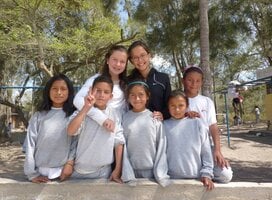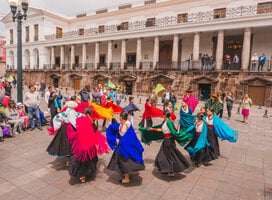Teach English in Ecuador
So you are thinking of teaching in Ecuador!? Latin America is a rapidly growing region with rich culture and vastly different regions. Ecuador is no exception, with the Andes, the coast line, and the Jungle you can find any type of city imaginable in this beautiful country that straddles the equator.
The culture in Ecuador is warm and welcoming. You will surely make friends and your students will appreciate your knowledge and the novelty of having a gringo teacher.
Ecuador recently adopted the US dollar as its currency, which largely stabilized the economy. Ecuadorians know that in order to enter the ever globalizing job market English is a huge asset, so demand is high, especially for native speakers.
If teaching in a beautiful country surrounded by mountains or the jungle, or on the coast with the Galapagos islands just a short flight away then Ecuador is the place for you!
In order to teach English in Ecuador, most teachers will require TEFL certification. Many schools prefer a bachelor’s degree, but it is not required. The average salary for teaching in Ecuador is $500 - $800 per month.
Types of Teaching Jobs in Ecuador
As in many other places in Latin America formal contracts will not always be found unless at a university or international school. Sometimes verbal contracts of between 6 months and a year are more common.
Private Language Academies/Schools:
These places will generally hire you without a Bachelors in English or teaching and without one of the plethora of English teaching certifications. But the pay may be less ($3 - $5 an hour)
International Schools:
These can be some of the best placements as the students work harder and the pay will be a bit better ($5-$7 an hour). You will need better qualifications in order to get jobs at an International school.
Universities, if you have the proper qualifications:
These can be some of the best placements as the students work harder and the pay will be a bit better ($5-$7 an hour). You will need better qualifications in order to get jobs at an International school.
Public Schools:
The best paying jobs and best benefits come with jobs at the University (Pontifica Universidad Catolica de Quito) but they also require the most qualifications.
Public Schools:
This can sound the most unappealing. Occasionally the kids are forced to take English classes and can be a little bit tougher to teach, although some find that the most rewarding type of job (maybe you'll get some "Oh, Captain my Captains"). The pay will also not be the best in public schools ($3-$5 an hour)
Private Lessons:
There is a fairly high demand for English teachers and you can find many parents who want to learn English and want their children to learn. Read up on the experiences of one teacher in Quito who found teaching private lessons to be a great way to stay on his feet, (although some say it is important to have more experience in order to properly teach the complex language.)
Where and When to Look for Jobs:
Teaching jobs are mostly found in the three biggest cities, Quito, Guayaquil, and Cuenca. Quito is the capital of the country and the second highest capital in the world. It is a large metropolis with incredible architecture and a rich history with plenty of opportunities in for teaching. Cuenca and Guayaquil are smaller but are very popular destinations for English teachers. Outside of these cities you may have a hard time finding legitimate work and proper wages.
The primary hiring times are February - March and July - August. It is possible to find jobs online from your home country, especially if there are American companies. Also, you can easily use the internet if you want to take advantage of programs that offer certifications followed by placement. Otherwise in order to find work it is recommended to go to the city (with some savings to keep you afloat) and begin the journey of looking for work. This way interviews can be easier and makes hiring you much easier. Perhaps teach private lessons while you look for more steady work.
Qualifications:
Although it can feel like you are in kindergarten relearning the alphabet as you navigate all the certification acronyms, TEFL, TESOL, TESL, EFL, ESL, and CELTA, they are not entirely all that different (although CELTA seems to be seen as the best of them all) the best English schools in Ecuador require one of these certifications as well as teaching experience. Many schools require the TEFL or teaching experience, and if you've got those, they may be willing to waive their normal undergraduate degree requirement. It's also possible to get a teaching job without TEFL training but if you are certified you will qualify for better schools and probably make more money. If you have an undergraduate degree in education with a US teaching certification your prospects will be even better. There are plenty of organizations that offer TEFL training on site and assistance with placement.
Salary & Cost of Living:
The cost of living in Ecuador is among the cheapest in South America. If you have any amount of savings when you arrive you will be able to sustain yourself for some time and or supplement your income fairly well.
The average cost of living is around $400 - $600 and you will make at least that much. At any school and more depending on your qualifications. Obviously your choice of lifestyle will greatly affect how for your income goes. If you are planning on hitting the town every night and traveling every weekend you may drain your account fairly quickly. But if you are content to become a true resident and live like the locals you will be just fine.
Jobs will rarely provide any type of housing for their teachers. In some cases at higher end schools and universities they may help you find housing but will not provide it. Use the local newspaper (if you speak Spanish well enough) to find housing. Also, connect with other expats, through groups like the South American Explorers (SAE) or Expat Facebook Groups. SAE requires a fairly small membership fee but provides a lot of assistance through their Quito clubhouse and may be able to help giving suggestions for housing. Likewise, you will be very hard pressed to find any programs that offer to help with airfare.
Classroom & Work Culture:
Women should know that as in many Latin American cultures it is a very patriarchal society and machismo is a real cultural characteristic. So, be aware of this in how you dress, especially in the classroom when teaching both adults and teens.
Students and teachers can develop relationships and friendships just like in the US. Especially when working for a family in private lessons you may come to seen as part of the family. With classes of adults you usually have students that are very willing and dedicated to learning the language. They will see the benefits and know the costs of being there, they will work hard for you and you won't have to worry too much about being assertive or a task master. When dealing with teens this can be a different issue.
Teens can be resistant, especially if they are being forced to go by their parents. You may have to be a bit more assertive with them. Once you have their respect, though they, too should work hard for you. Latin American culture is very focused on family and friendship so many of the students may endear you as their gringo teacher.
The dress code for a classroom can vary depending on where you are teaching. In private lessons there is no real dress code, base it on each specific client; some will be fine if you are wearing shorts and a t-shirt some prefer a collared shirt. Universities and International schools will have dress codes much like in the United States. Public schools are a little more relaxed but you should always notice what other teachers are wearing and base it off that.
In Ecuador handshakes are the standard greeting between any gender. As in any country always be very observant to the customs of the people around you. Follow the lead of the person you are greeting and don't assume it is just like the United States.
Relocating to a different country can be scary and stressful but in the end, it will likely be an immensely rewarding experience.
Contributed by Ryan Carrier
Teaching Programs in Ecuador
Related Teach Abroad Articles
Frequently Asked Questions
-
How do I become an English teacher in South America?
To become an English teacher in South America, you'll first want to do your research and pick a general location where you'd want to teach. You'll need to pay attention to the hiring season since South America is in the southern hemisphere and has opposite seasons from North America. Requirements for training and qualifications will vary depending on the country, but for the most part, you'll need to hold a Bachelor's degree and you may also need a teaching certification, such as TEFL or TESOL. You can then start researching jobs by checking out job boards, government jobs, and private tutoring options.
Related Content -
How much can you make teaching English in South America?
Wages for English teachers will vary by the country, city, and type of school you're hoping to teach in. In Argentina for example, you could expect to make between $600-$1,200 per month, while in Bolivia you might make $400-$600 per month. Keep in mind that countries that have a lower salary range will also generally have a lower cost of living.

























